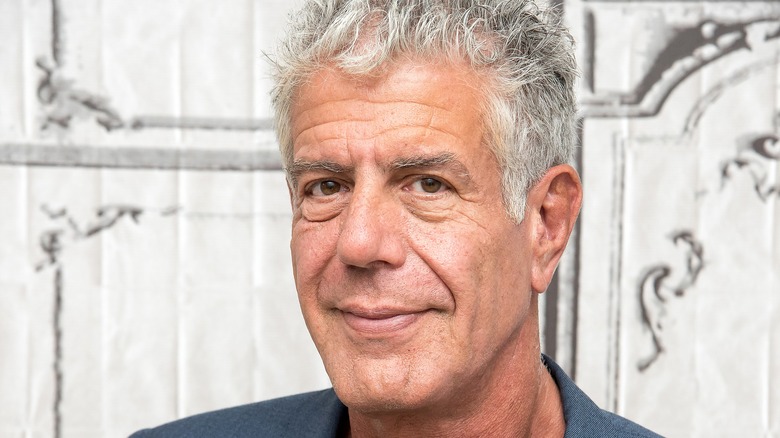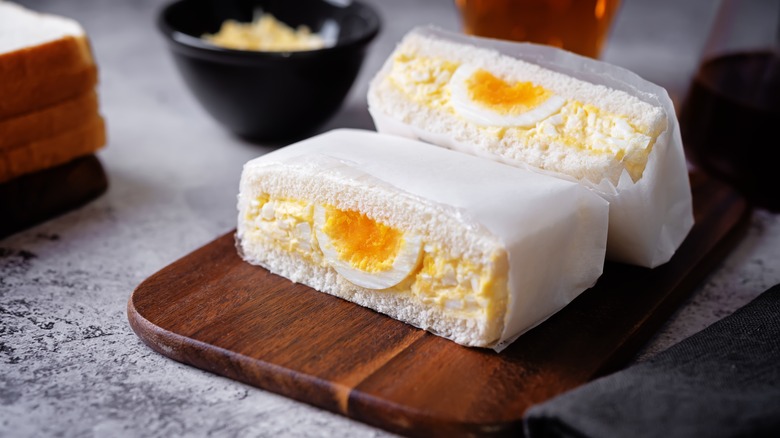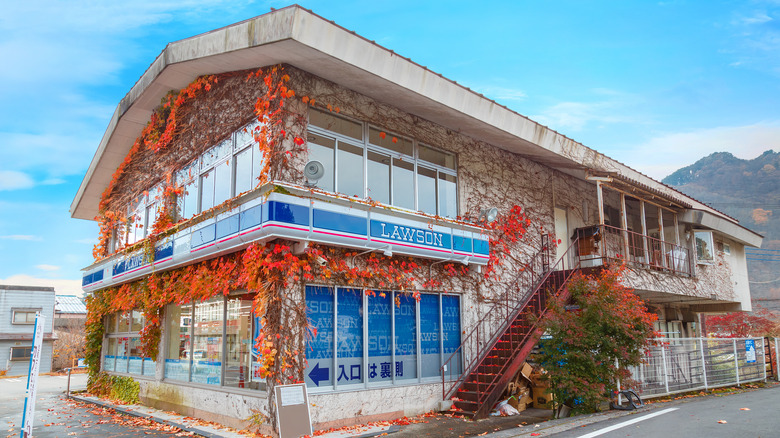Anthony Bourdain's 'One Vice' He Couldn't Quit Was A Japanese Convenience Store's Sandwiches
Anthony Bourdain was very open about his vices and bad habits. He spoke candidly about his former drug addictions, substantial debts, and alluded to his solicitation of sex workers. He was a heavy smoker (although he quit for a while) and even indulged in a little weed on his show. These aspects added to his bad boy image but there was nothing bogus about it. Bourdain was a flawed individual who wore his heart on his sleeve and people loved him for that — his rough edges made him seem more human and relatable than many other celebrity chefs. One of the lighter-hearted "vices" that he claimed he was unable to shake could be found in the chiller cabinet section of a Japanese convenience store: a humble egg salad sandwich.
In Season 6, Episode 3 of "Parts Unknown," Bourdain visited the main island of Okinawa, an unmissable tourist destination in Japan. Following his usual format, he spent his time delving into the distinctive history and culture of the prefecture while tucking into local delicacies with his interview subjects. In a place with a strong U.S. military presence, this ranged from slurping a bowl in a traditional noodle shop to sampling the guilty-pleasure hybrid of taco rice. Towards the end of the episode, he mused on his past vices (including the "musical stylings of Steven Tyler") before dropping into a Lawson convenience store to grab one of his favorite egg sandwiches (Tomago Sando), which he referred to as "pillows of love."
What is so special about a Japanese egg salad sandwich?
What is so great about an egg salad sandwich, you might wonder? In a world where Instagrammable gourmet sarnies are a thing, the vintage combo of boiled eggs mashed up with mayonnaise may not be cool but it is still a beloved staple. The classic filling lagged some way behind the grilled cheese in a 2024 Newsweek poll, yet 21% of respondents called it their favorite. Over in Britain, where pre-packaged sandwiches are a multi-billion dollar industry, egg mayo is one of three core ingredients (also featured on BLT and chicken salad) that make up around 80% of all sales. For its devotees, the charm of the simple egg salad sandwich is its sense of comfort and nostalgia.
Perhaps that's why Anthony Bourdain just couldn't give up his "pillows of love." During his earlier Tokyo trip, one of his favorite places to visit, in "Parts Unknown" (Season 2, Episode 7), he raved: "At Lawson's, you can dig into their unnaturally fluffy, insanely delicious, incongruously addictive egg salad sandwiches. I love them."
For others who have also been wowed, it is the little differences to the egg mayo back home that makes it so special. Served between two slices of wonderfully soft milk bread (shokupan), the recipe calls for kewpie mayonnaise. This Japanese variation differs from regular American mayo because it is made from only the egg yolks to give it a richer texture, whisked up with vinegar, oil, MSG, and other seasonings.
Convenience stores are everywhere in Japan
Anthony Bourdain's beloved Japanese egg salad sandwich and the store he liked to buy them from are a happy combination of international influences. The sandwich itself traces its roots back to the 19th century when Japanese teahouses started serving sarnies in the western style with a local twist. As popularity grew, the tomago sando became a staple of Japanese cuisine, a cheap lunchtime solution found across the nation in cafes, convenience stores, and vending machines. Egg salad isn't the only option: Other popular fillings include ham and egg, chicken katsu, and fruit mix.
American-style convenience stores began to take hold with the opening of the first Japanese 7-Eleven in 1974. The phenomenon boomed over the next few decades and many of the largest chains offer their version of an egg salad sandwich. Bourdain's favorite, Lawson, is a franchise with an interesting cross-cultural history. It started out as a dairy delivery service in Ohio in 1939 and expanded to a nationwide chain of 700 stores. The franchise was sold to Dairy Mart in 1985, which subsequently went bankrupt. But it wasn't the end for Lawson — the company had already shipped out into Japan in the 1970s and now it has around 14,000 branches, making it Japan's third-largest convenience store chain after 7-Eleven and FamilyMart. The pendulum is now swinging back Stateside again; thanks to Bourdain's popularity, there are no end of food bloggers and influencers posting their take on the globetrotting chef's egg sandwich vice.


